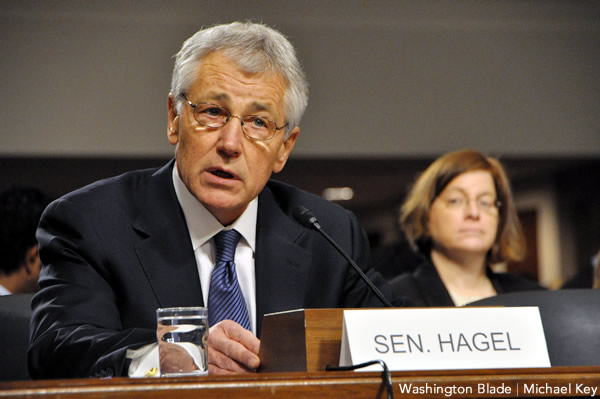National
Hagel confirmed as defense secretary
Senate approves controversial nominee, 58-41


Defense secretary nominee Chuck Hagel was confirmed by the Senate by a 58-41 vote (Washington Blade photo by Michael Key)
The U.S. Senate confirmed former Sen. Chuck Hagel as defense secretary on Tuesday following assurances that he would work on behalf of LGBT military families and controversy over his anti-gay past.
Senators approved the Nebraska Republican’s nomination by a 58-41 vote late in the afternoon. That confirmation vote took place more than four hours after the Senate invoked cloture to end debate on his nomination by a vote of 71-27.
In a statement, President Obama commended the Senate for confirming Hagel on a bipartisan vote — along it was the first time ever a defense secretary nominee was filibustered — and called the new Pentagon chief “the leader our troops deserve.”
“I will be counting on Chuck’s judgment and counsel as we end the war in Afghanistan, bring our troops home, stay ready to meet the threats of our time and keep our military the finest fighting force in the world,” Obama said. “Most of all, I am grateful to Chuck for reminding us that when it comes to our national defense, we are not Democrats or Republicans, we are Americans, and our greatest responsibility is the security of the American people.”
Last week, a previous vote in the Senate to proceed with the Hagel confirmation was 58-40, which was short of the 60-vote threshold needed to end a filibuster and move on to confirmation. Hagel was confirmed on Tuesday as a result of Republicans changing their votes on whether to end debate on the nomination.
Among those casting a vote in favor of Hagel was lesbian Sen. Tammy Baldwin (D-Wis.), who previously told Washington Blade she had a “very good conversation” with him and would support his nomination. Last month, Baldwin said she had “tough questions” about his view of the post-“Don’t Ask, Don’t Tell” military.
Hagel’s nomination was controversial in the LGBT community because of remarks he made in 1998, when he said the U.S. ambassador to Luxembourg, Jim Hormel, shouldn’t be confirmed to the post because he’s “openly aggressively gay.” Hagel also had a dismal voting record on LGBT issues during his tenure in the U.S. Senate. Just prior to his nomination as defense secretary, Hagel apologized for the anti-gay remarks.
Since being nominated for the position of defense secretary, Hagel has expressed a commitment to gay service members, saying he supports “Don’t Ask, Don’t Tell” repeal and pledged as part of testimony before the Senate to move “expeditiously” to enact certain benefits for troops with same-sex partners that are allowed despite the Defense of Marriage Act.
Earlier this month, outgoing Defense Secretary Leon Panetta announced most of these benefits would be enacted —and set a goal for implementing them by Aug. 31, but no later than Oct. 1. Hagel will be responsible for seeing through their implementing them in addition to other benefits — such as health and pension benefits — that may be awarded to gay troops with same-sex partners if the Supreme Court strikes down DOMA.
Allyson Robinson, executive director of the LGBT military group OutServe-SLDN, praised the Senate for confirming Hagel, but urged him to go further in his commitment to LGBT troops by instituting non-discrimination protections for gay service members.
“It has been reassuring to see Sen. Hagel show the kind of clear, unambiguous leadership in support of our service members and their families he has demonstrated in recent months,” Robinson said. “Now he has the opportunity to turn his commitments into action, and we look forward to working with him to ensure our military embodies the same values of fairness and equality it protects.”
Currently, no recourse exists for gay service members outside of their chain of command if they feel they’ve experienced discrimination based on their sexual orientation.
However, in response to requests to implement an explicit non-discrimination policy, Pentagon officials reiterate the current policy to treat everyone in the military with fairness.
OutServe-SLDN had previously called on President Obama to issue an executive order instituting a non-discrimination policy for LGBT service members.
Hagel’s confirmation was a rocky road made more so because of Republican opposition to his nomination. Senators like James Inhofe (R-Okla.) and Roy Blunt (R-Mo.) attempted to filibuster his nomination on the basis of positions he’s taken on Iran and Israel, including his decision not to sign a 2000 letter by the American Israel Public Affairs Committee.
The Log Cabin Republicans ran full-page ads opposing Hagel in The Washington Post and The New York Times — expressing similar concerns about his positions on Iran and Israel as well as concern over anti-gay remarks made against Hormel.
Gregory Angelo, executive director of Log Cabin Republicans, said upon news of Hagel’s confirmation he’ll be watching the defense secretary to see if the repudiation of his previous anti-gay comments and commitment to LGBT military families is genuine.
“It is up to Secretary Hagel to turn his recent words into actions,” Angelo said. “We will be watching to make sure his change of heart is sincere and look forward to working with him on the completion of the implementation of ‘Don’t Ask, Don’t Tell’ repeal.”
NOTE: This article has been updated to include a statement from President Obama.
New York
Two teens shot steps from Stonewall Inn after NYC Pride parade
One of the victims remains in critical condition

On Sunday night, following the annual NYC Pride March, two girls were shot in Sheridan Square, feet away from the historic Stonewall Inn.
According to an NYPD report, the two girls, aged 16 and 17, were shot around 10:15 p.m. as Pride festivities began to wind down. The 16-year-old was struck in the head and, according to police sources, is said to be in critical condition, while the 17-year-old was said to be in stable condition.
The Washington Blade confirmed with the NYPD the details from the police reports and learned no arrests had been made as of noon Monday.
The shooting took place in the Greenwich Village neighborhood of Manhattan, mere feet away from the most famous gay bar in the city — if not the world — the Stonewall Inn. Earlier that day, hundreds of thousands of people marched down Christopher Street to celebrate 55 years of LGBTQ people standing up for their rights.
In June 1969, after police raided the Stonewall Inn, members of the LGBTQ community pushed back, sparking what became known as the Stonewall riots. Over the course of two days, LGBTQ New Yorkers protested the discriminatory policing of queer spaces across the city and mobilized to speak out — and throw bottles if need be — at officers attempting to suppress their existence.
The following year, LGBTQ people returned to the Stonewall Inn and marched through the same streets where queer New Yorkers had been arrested, marking the first “Gay Pride March” in history and declaring that LGBTQ people were not going anywhere.
New York State Assemblywoman Deborah Glick, whose district includes Greenwich Village, took to social media to comment on the shooting.
“After decades of peaceful Pride celebrations — this year gun fire and two people shot near the Stonewall Inn is a reminder that gun violence is everywhere,” the lesbian lawmaker said on X. “Guns are a problem despite the NRA BS.”
New York
Zohran Mamdani participates in NYC Pride parade
Mayoral candidate has detailed LGBTQ rights platform

Zohran Mamdani, the candidate for mayor of New York City who pulled a surprise victory in the primary contest last week, walked in the city’s Pride parade on Sunday.
The Democratic Socialist and New York State Assembly member published photos on social media with New York Attorney General Letitia James, telling followers it was “a joy to march in NYC Pride with the people’s champ” and to “see so many friends on this gorgeous day.”
“Happy Pride NYC,” he wrote, adding a rainbow emoji.
Mamdani’s platform includes a detailed plan for LGBTQ people who “across the United States are facing an increasingly hostile political environment.”
His campaign website explains: “New York City must be a refuge for LGBTQIA+ people, but private institutions in our own city have already started capitulating to Trump’s assault on trans rights.
“Meanwhile, the cost of living crisis confronting working class people across the city hits the LGBTQIA+ community particularly hard, with higher rates of unemployment and homelessness than the rest of the city.”
“The Mamdani administration will protect LGBTQIA+ New Yorkers by expanding and protecting gender-affirming care citywide, making NYC an LGBTQIA+ sanctuary city, and creating the Office of LGBTQIA+ Affairs.”
U.S. Supreme Court
Supreme Court upholds ACA rule that makes PrEP, other preventative care free
Liberal justices joined three conservatives in majority opinion

The U.S. Supreme Court on Friday upheld a portion of the Affordable Care Act requiring private health insurers to cover the cost of preventative care including PrEP, which significantly reduces the risk of transmitting HIV.
Conservative Justice Brett Kavanaugh authored the majority opinion in the case, Kennedy v. Braidwood Management. He was joined by two conservatives, Chief Justice John Roberts and Justice Amy Coney Barrett, along with the three liberal justices, Sonia Sotomayor, Elena Kagan, and Ketanji Brown-Jackson.
The court’s decision rejected the plaintiffs’ challenge to the Affordable Care Act’s reliance on the U.S. Preventative Services Task Force to “unilaterally” determine which types of care and services must be covered by payors without cost-sharing.
An independent all-volunteer panel of nationally recognized experts in prevention and primary care, the 16 task force members are selected by the secretary of the U.S. Department of Health and Human Services to serve four-year terms.
They are responsible for evaluating the efficacy of counseling, screenings for diseases like cancer and diabetes, and preventative medicines — like Truvada for PrEP, drugs to reduce heart disease and strokes, and eye ointment for newborns to prevent infections.
Parties bringing the challenge objected especially to the mandatory coverage of PrEP, with some arguing the drugs would “encourage and facilitate homosexual behavior” against their religious beliefs.
-

 U.S. Supreme Court3 days ago
U.S. Supreme Court3 days agoSupreme Court upholds ACA rule that makes PrEP, other preventative care free
-

 U.S. Supreme Court4 days ago
U.S. Supreme Court4 days agoSupreme Court rules parents must have option to opt children out of LGBTQ-specific lessons
-

 National5 days ago
National5 days agoEvan Wolfson on the 10-year legacy of marriage equality
-

 Congress4 days ago
Congress4 days agoSenate parliamentarian orders removal of gender-affirming care ban from GOP reconciliation bill












